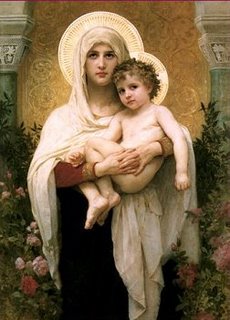Mary, Mother of God
 Calling Mary either Theotokos or "Mother of God" (ΜΡ ΘΥ) was never meant to suggest that Mary was coeternal with God, or that she existed before Jesus Christ or God existed. Rather, her divine maternity is only in regard to the mystery of the Incarnation. The Church acknowledges as much in the words of this ancient hymn: "He whom the entire universe could not contain was contained within your womb, O Theotokos."
Calling Mary either Theotokos or "Mother of God" (ΜΡ ΘΥ) was never meant to suggest that Mary was coeternal with God, or that she existed before Jesus Christ or God existed. Rather, her divine maternity is only in regard to the mystery of the Incarnation. The Church acknowledges as much in the words of this ancient hymn: "He whom the entire universe could not contain was contained within your womb, O Theotokos."Theotokos is a compound of two Greek words, θεός "God" and τόκος "parturition, childbirth." Literally, this translates as "God-bearer" or "the one who gives birth to God." However, since many English-speaking Orthodox find this literal translation awkward, in liturgical use "Theotokos" is often left untranslated, or paraphrased as "Mother of God." This latter title (in Greek Μήτηρ Θεού) has an established usage of its own in certain hymns, but especially on icons of the Theotokos, where it is usually abbreviated as ΜΡ ΘΥ. However, "Mother of God" and "Theotokos" are not synonymous, as the first describes a family relationship but not necessarily physical childbearing, which is expressed by the latter. This means that Mother of God must be understood by the person employing the term, as not referring to Mary as Mother of God from eternity but rather only with reference to the birth of Jesus, that is, God's birth on earth in flesh. By contrast, Theotokos makes this information explicit, thus excluding any misunderstanding of the Mary's divine maternity.
The name Mary in other languages: "Mary" appears in other languages: Arabic مريم (Maryam); Septuagint Greek Μαριάμ, Mariam, Μαρία, Maria, Late Latin: Maria, Māryām; Syriac: Mart Maryam). -- Wikipedia
Labels: Theology

2 Comments:
Thanks Father for that nice explanation of Theotokos. I can't understand why that should rankle the Protestants so much. I often wonder why "calling her name blessed" is one of those Scriptures they can't take literally .
God bless and Happy New Year!
Mothers are undervalued in American society. Perhaps that carries over to the BVM.
Post a Comment
<< Home